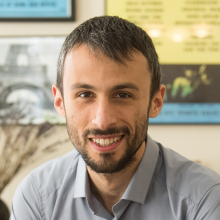Fighting cancer, one cell at a time
Fighting cancer, one cell at a time
New scientists

Scientists are now able to zero in on single cells within the diverse populations of cells in living tissues, including inside cancer tumors. Called single-cell genomics, these new tools are vital for understanding individual responses to drug therapies and interventions, and for eradicating tumors so that they don’t come back.
Dr. Itay Tirosh is a computational and systems biologist who is taking the field of single-cell genomics into new areas of discovery. During his postdoctoral fellowship at the Broad Institute of MIT and Harvard, Dr. Tirosh used single-cell RNA-Sequencing (RNA-Seq), to measure thousands of individual cells simultaneously. The technology provides unprecedented opportunities to investigate the various malignant, stromal, and immune cells in the tumor microenvironment of individual patients during different stages of treatment.
“As a systems biologist, I was struck by the fact that such complex systems—human tumors—are traditionally studied as a single entity and often reduced to a small set of mutations,” says Dr. Tirosh, who joined the Weizmann Institute’s Department of Molecular Cell Biology in August and previously did his doctorate and master’s degree here. “I wanted to understand the full complexity of human tumors, so I turned to emerging single-cell approaches and collaborated with clinicians to be able to apply these directly to patient samples."
A comprehensive understanding of these processes provides the basis for identifying why existing cancer therapies are only effective in a subset of patients. It is expected to also help in the discovery of new potential targets based on the genetic, molecular, and cellular characteristics of each individual patient and tumor. Or, in other words, enable truly personalized medicine.
Dr. Tirosh was among the pioneers applying single-cell RNA-Seq to solid human tumors, showing, for the first time, the extent of incredible heterogeneity inside glioblastoma tumors—an aggressive form of brain cancer— that is usually masked by standard “bulk” tumor profiling. Dr. Tirosh also used his unique skill set to dissect the tumor ecosystem in metastatic melanoma and provide insights into the heterogeneity of cancer cells within the tumors, as well as T cells and other cells that may be influencing cancer behavior and response to treatment.
Single-cell approaches to understanding tissue heterogeneity are of clear and immediate impact in cancer research. By characterizing tumors at the single-cell level, physicians will be able to tailor treatments targeting the tumor mass, as well as specific types of cells that are evading conventional cancer treatment. Dr. Tirosh plans to continue using single cell genomics to profile the evolution of tumors and to apply new computational methods to fight cancer one cell at a time.
Dr. Tirosh’s personal story gives new meaning to the phrase “Weizmann family”: He is married to Reut Shema, a graduate of the Weizmann Institute and a recipient of its Israel National Postdoctoral Award for Advancing Women in Science; they did their postdoc fellowships at the Broad Institute and Harvard simultaneously. Reut’s twin sister, Efrat Shema-Yaacoby, also did her postdoc in Boston during the same time period and is joining the Weizmann Institute’s Department of Biological Regulation as a principal investigator as well.
Dr. Tirosh is the second Zuckerman Scholar to join the Weizmann Institute as a new tenure-track scientist. The Zuckerman STEM Leadership Program was initiated in 2016 with a gift of $100 million from American business leader and philanthropist Mortimer B. Zuckerman, with a goal to cultivate deeper scientific ties between North America and Israel. The gift, which is split evenly between four Israeli institutions of higher learning including the Weizmann Institute, funds postdoctoral fellows from the U.S., Canada, and other Western countries during their fellowship periods in Israel. It also supports the recruitment of top Israeli scholars like Dr. Spiegel from abroad who join the faculties of the Israeli institutions, enabling the Israeli institutions to effectively compete with top North American institutions for the best candidates.
The other participating institutions are the Technion- Israel Institute of Technology, Tel Aviv University, and The Hebrew University of Jerusalem.
Dr. Tirosh is supported by the A.M.N. Fund for the Promotion of Science, Culture and Arts in Israel and the Estate of Dr. David Levinson. He is a Zuckerman Program faculty scholar.








